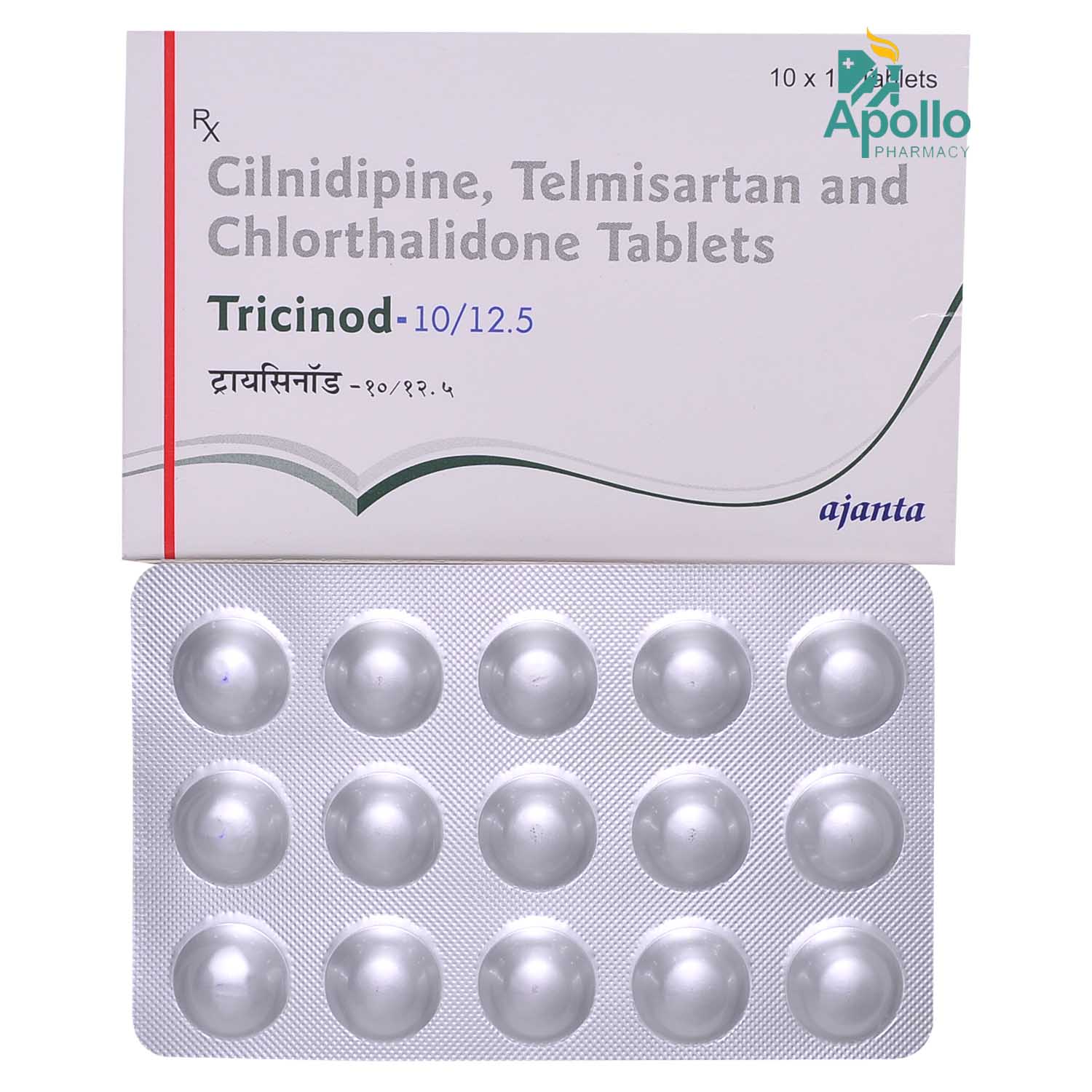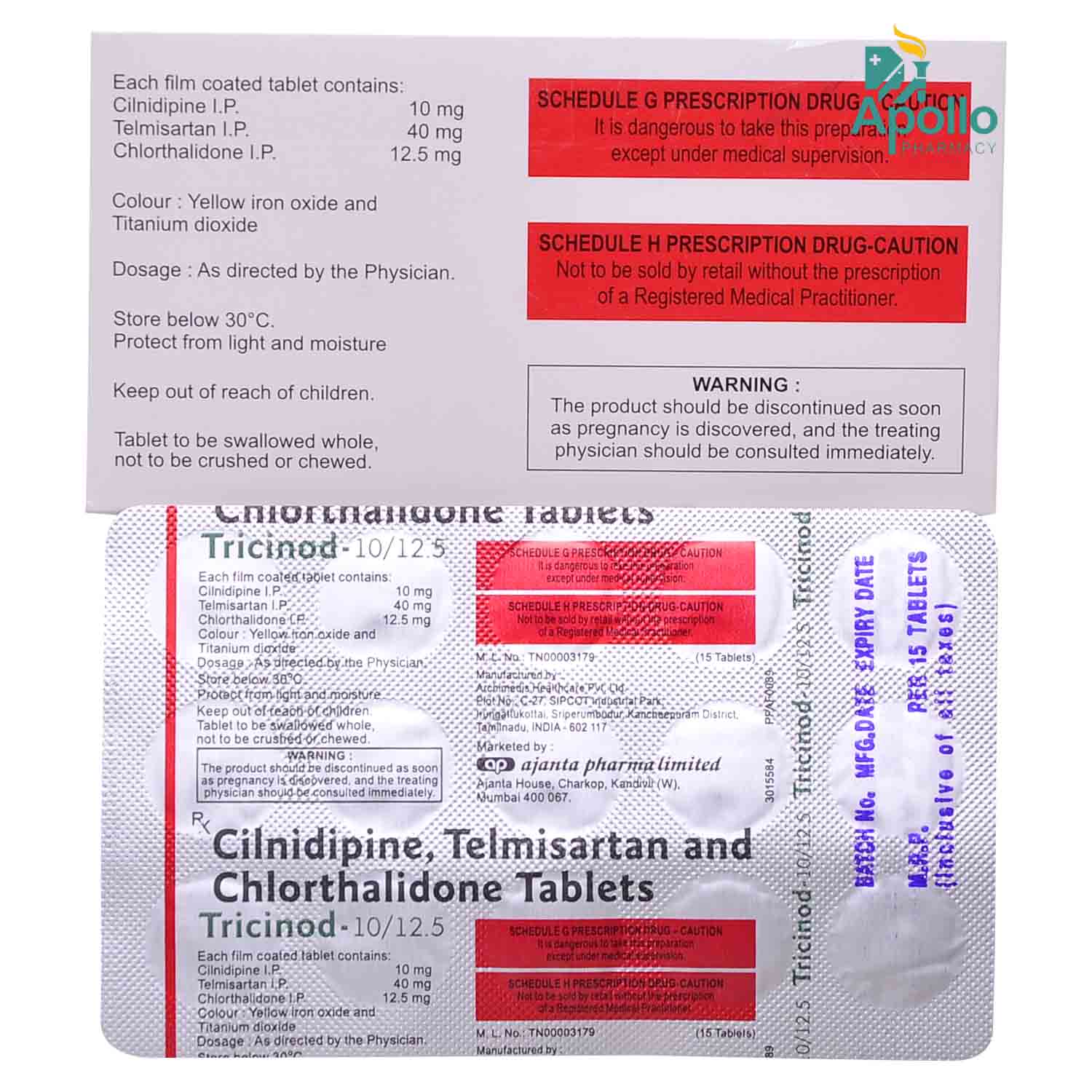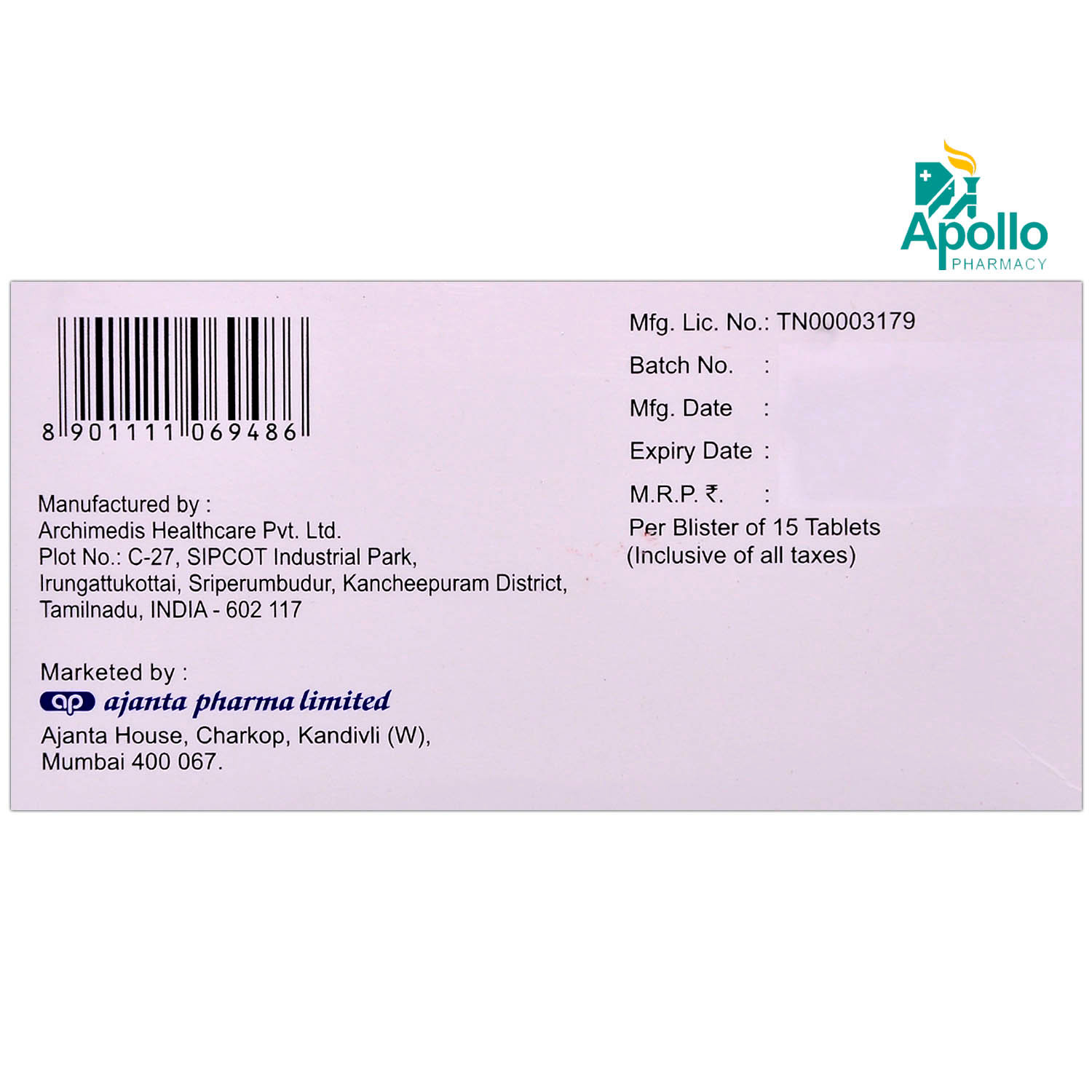Tricinod 10 mg/12.5 mg Tablet 15's
MRP ₹324
(Inclusive of all Taxes)
₹48.6 Cashback (15%)
Selected Pack Size:15
15 ₹291.6
(₹19.44 per unit)
In Stock
Provide Delivery Location
Online payment accepted
 Prescription drug
Prescription drugWhats That
Manufacturer/Marketer :
Consume Type :
Expires on or after :
Return Policy :
About Tricinod 10/12.5 Tablet
Tricinod 10/12.5 Tablet belongs to the class of anti-hypertensives primarily used to treat hypertension (high blood pressure) and heart-related chest pain (angina). It comprises Cilnidipine (calcium channel blocker), Telmisartan (angiotensin receptor blocker), and Hydrochlorothiazide (diuretics/'water pills). Hypertension is a lifelong or chronic condition in which the force exerted by the blood against the artery walls becomes so high that it leads to heart disease. Angina is chest pain caused by reduced blood flow to the heart.
Tricinod 10/12.5 Tablet is composed of three medicines, namely Telmisartan, Cilnidipine, and Hydrochlorothiazide. Telmisartan works by blocking the action of certain substances that are responsible for tightening the blood vessels. It allows the blood to flow more smoothly and makes the heart more efficient at pumping blood throughout the body. Cilnidipine blocks the activities of the calcium channels present in the blood vessels of the heart. As a result, the blood vessels widen, and supply to the heart increases, lowering the elevated blood pressure and the workload placed on the heart. Thus, it reduces the chance of having any heart attack or stroke in the future. Hydrochlorothiazide is a diuretic pill that works by making a person urinate more. In this way, this drug helps to get rid of excess salt and water from the body and prevents the risk of heart failure, kidney or liver disease.
Take Tricinod 10/12.5 Tablet in the same manner as suggested by your doctor. Your doctor will advise you how often you need to take Tricinod 10/12.5 Tablet based on your medical condition. Common side effects of Tricinod 10/12.5 Tablet include sore back, diarrhoea, congested feeling, spinning sensation, soreness in the sinus. Most of these side effects of Tricinod 10/12.5 Tablet do not require medical attention and gradually resolve over time. However, if the side effects are persistent, reach out to your doctor.
Don't stop taking Tricinod 10/12.5 Tablet without your doctor's advice. Sudden Stopping Tricinod 10/12.5 Tablet may cause changes in your heart rhythm and blood pressure, cause chest pain, or a heart attack. Your doctor will lower your dose gradually over a period of time to help prevent these symptoms. It is advised to drink plenty of fluids while taking this medicine to overcome dry mouth and extreme thirst. Patients suffering from kidney problems may be required to undergo regular blood creatinine, and potassium levels tests as Tricinod 10/12.5 Tablet affect electrolytes level in our body can be monitored.
Uses of Tricinod 10/12.5 Tablet
Directions for Use
Key Benefits
Tricinod 10/12.5 Tablet is composed of three medicines: Telmisartan, Cilnidipine and Hydrochlorothiazide, prescribed to treat hypertension. Telmisartan works by blocking the action of certain substances that are responsible for tightening the blood vessels. It allows the blood to flow more smoothly and makes the heart more efficient at pumping blood throughout the body. Cilnidipine blocks the activities of the calcium channels present in the blood vessels of the heart. As a result, the blood vessels widen, and supply to the heart increases, lowering the elevated blood pressure and the workload placed on the heart. Thus, it reduces the chance of having any heart attack or stroke in the future. Hydrochlorothiazide is a diuretic pill that works by making a person urinate more. In this way, this drug helps to get rid of excess salt and water from the body and prevents the risk of heart failure, kidney, or liver disease.
Storage
- Eat a balanced diet: Less liver, seafood, and red meat, and more fruits, vegetables, dairy, and whole grains. Limit sugary treats and drinks.
- Drink alcohol in moderation: Too much beer, wine, or spirits can increase uric acid.
- Stay hydrated: Drink plenty of water, at least 8-10 glasses daily.
- Maintain a healthy weight and exercise regularly to reduce uric acid.
- Manage stress with meditation or yoga.
- Regular health checks: Monitor uric acid levels and follow up with your doctor to adjust your treatment plan.
- Hydrate your body: Drink enough water to prevent dehydration and headaches.
- Calm Your Mind: Deep breathing and meditation can help you relax and relieve stress.
- Rest and Recharge: Sleep for 7-8 hours to reduce headache triggers.
- Take rest: lie down in a quiet, dark environment.
- Cold or warm compresses can help reduce tension.
- Stay Upright: Maintain good posture to keep symptoms from getting worse.
- To treat headaches naturally, try acupuncture or massage therapy.
- Over-the-counter pain relievers include acetaminophen and ibuprofen.
- Prescription Assistance: Speak with your doctor about more substantial drug alternatives.
- Severe Headaches: Seek emergency medical assistance for sudden, severe headaches.
- Frequent Headaches: If you get reoccurring headaches, consult your doctor.
- Headaches with Symptoms: Seek medical attention if your headaches include fever, disorientation, or weakness.
- Inform your doctor about dizziness symptoms. They may adjust your medication regimen or prescribe additional medications to manage symptoms.
- Follow your doctor's instructions for taking medication, and take it at the same time every day to minimize dizziness.
- When standing up, do so slowly and carefully to avoid sudden dizziness.
- Avoid making sudden movements, such as turning or bending quickly, which can exacerbate dizziness.
- Drink plenty of water throughout the day to stay hydrated and help alleviate dizziness symptoms.
- If you're feeling dizzy, sit or lie down and rest until the dizziness passes.
- Track when dizziness occurs and any factors that may trigger it, and share this information with your doctor to help manage symptoms.
- Avoid triggers like alcohol, caffeine, and energy drinks.
- Try relaxation techniques such as yoga, meditation, or deep breathing.
- Exercise regularly as it helps maintain heart health.
- Follow a nutritious and balanced diet.
Drug Warnings
Tricinod 10/12.5 Tablet should be taken with caution in patients with congestive heart failure, liver disease, peripheral oedema (swelling of hands/legs), cardiogenic shock (when the heart suddenly can not pump sufficient blood), recent MI (myocardial infarction) or acute unstable angina (chest pain), severe aortic stenosis (when heart valves become diseased). You should monitor your blood pressure regularly to make sure the Tricinod 10/12.5 Tablet is working efficiently. Besides this prolonged intake of Tricinod 10/12.5 Tablet can lead to lowering of blood pressure (hypotension). So, daily monitoring of blood pressure is advisable.
Drug-Drug Interactions
Drug-Drug Interactions
Login/Sign Up
Co-administration of Tricinod 10/12.5 Tablet and cisapride may increase the risk or severity of an irregular heart rhythm that may be serious.
How to manage the interaction:
Taking Tricinod 10/12.5 Tablet with Cisapride is not recommended, please consult your doctor before taking it. Do not discontinue the medication without consulting a doctor.
Co-administration of Aliskiren with Tricinod 10/12.5 Tablet can increase the risk of hyperkalemia (high potassium levels in the blood).
How to manage the interaction:
Taking Tricinod 10/12.5 Tablet with Aliskiren can possibly lead to an interaction, please consult a doctor before taking it. Do not discontinue the medications without consulting a doctor.
Co-administration of Tricinod 10/12.5 Tablet with pimozide can increase the risk of an irregular heart rhythm that may be serious.
How to manage the interaction:
Although there is an interaction, Tricinod 10/12.5 Tablet can be taken with pimozide if prescribed by the doctor. Consult the prescriber if you develop sudden dizziness, lightheadedness, fainting, or fast or pounding heartbeats during treatment with pimozide. Also, let the doctor know if you experience signs of electrolyte disturbance, such as weakness, tiredness, drowsiness, confusion, muscle pain, cramps, dizziness, nausea, or vomiting. Do not discontinue any medications without consulting a doctor.
Co-administration of Aminolevulinic acid and Tricinod 10/12.5 Tablet may increase the risk of severe sunburn.
How to manage the interaction:
Taking Tricinod 10/12.5 Tablet with Aminolevulinic acid together can possibly result in an interaction, but it can be taken if a doctor has advised it. If you notice that your skin is very sensitive to sunlight or if you have a really bad sunburn, it's important to contact your doctor right away. Do not discontinue any medications without consulting a doctor.
Co-administration of Tricinod 10/12.5 Tablet with ziprasidone can increase the risk of an irregular heart rhythm that may be serious.
How to manage the interaction:
Although there is an interaction, Tricinod 10/12.5 Tablet can be taken with ziprasidone if prescribed by the doctor. but it can be taken together if prescribed by a doctor. However, consult your doctor if you experience sudden dizziness, lightheadedness, fainting, shortness of breath, weakness, tiredness, drowsiness, confusion, muscle pain, cramps, nausea, or vomiting. Do not discontinue any medications without consulting a doctor.
Taking Droperidol can make Tricinod 10/12.5 Tablet less effective in lowering blood pressure.
How to manage the interaction:
Taking Tricinod 10/12.5 Tablet with Droperidol together can possibly result in an interaction, but it can be taken if your doctor has advised it. If you have any of these symptoms, it's important to contact your doctor right away. These symptoms include an irregular heart rhythm, severe or long-lasting diarrhea or vomiting, complications, sudden dizziness or lightheadedness, fainting, difficulty breathing, heart palpitations, weakness, feeling sleepy or confused, muscle pain, and feeling nauseous or vomiting. Do not stop using any medications without first talking to your doctor.
Co-administration of Tricinod 10/12.5 Tablet together with lithium can increase the effects of lithium.
How to manage the interaction:
Although there is a interaction between Tricinod 10/12.5 Tablet and lithium, but it can be taken together if prescribed by a doctor. However, consult your doctor if you experience diarrhea, vomiting, drowsiness, shaking of hands and legs, thirst, increased urination, lack of coordination, or muscle weakness. Do not discontinue any medications without consulting a doctor.
Taking Tricinod 10/12.5 Tablet can make the body eliminate Arsenic trioxide faster, leading to lower levels in the blood and potentially reducing its effectiveness.
How to manage the interaction:
Co-administration of Tricinod 10/12.5 Tablet with Arsenic trioxide can possibly result in an interaction, but it can be taken if a doctor has advised it. If you have any of these symptoms, it's important to contact a doctor right away: your heart beating irregularly, feeling dizzy or lightheaded, fainting, having a fast or pounding heartbeat, feeling weak or drowsy, being confused, experiencing muscle pain, or feeling nauseous or vomiting. Do not discontinue any medications without consulting a doctor.
Coadministration of Tricinod 10/12.5 Tablet with amiodarone may increase the risk of abnormal heart rhythms.
How to manage the interaction:
Although taking Tricinod 10/12.5 Tablet with amiodarone may cause an interaction, it is safe to do so if your doctor has prescribed it. If you have a cardiac problem or electrolyte imbalances, you may be more vulnerable. If you develop sudden dizziness, lightheadedness, fainting, shortness of breath, or a rapid heartbeat, consult a doctor. Do not stop taking any medications without visiting a doctor.
Co-administration of Tizanidine and Tricinod 10/12.5 Tablet may show additive effects and increase the risk of low blood pressure.
How to manage the interaction:
Although there is an interaction, Tricinod 10/12.5 Tablet can be taken with tizanidine if prescribed by the doctor. If you experience headache, dizziness, palpitations, or sweating, contact your doctor immediately. Do not discontinue any medications without consulting a doctor.
Drug-Food Interactions
Drug-Food Interactions
Login/Sign Up
Lentils, Orange Juice, Oranges, Raisins, Potatoes, Salmon Dried, Spinach, Sweet Potatoes, Tomatoes, Coconut Water, Beans, Beetroot, Broccoli, Bananas, Apricots, Avocado, Yogurt
How to manage the interaction:
When Tricinod 10/12.5 Tablet is taken along with potassium-containing salt substitutes or over-the-counter potassium supplements it may lead to high potassium levels in blood. Avoid taking potassium-containing salt substitutes or over-the-counter potassium supplements with Tricinod 10/12.5 Tablet as this can lead to high potassium levels in the blood. However, consult a doctor if you experience weakness, irregular heartbeat, confusion, tingling of the extremities, or feelings of heaviness in the legs.
Diet & Lifestyle Advise
- Keep your weight under control with a BMI of 19.5-24.9.
- Do regular physical activity or exercise for at least 150 minutes per week, or about 30 minutes most days of the week. Doing this can help lower your raised blood pressure by about 5 mm of Hg.
- Opt for a diet rich in whole grains, fruits, veggies, and low-fat dairy products.
- Limit intake of sodium chloride (table salt) in your daily diet to 2300 mg per day or less than 1500 mg is ideal for most adults.
- If you are taking alcohol, then only one serving for women and two servings for men is advisable.
- Quitting smoking is the best strategy to lower the risk of heart disease.
- Avoid chronic stress, as it can raise your blood pressure. Try to enjoy and spend time with your loved ones to cope with stress and practice mindfulness techniques.
- Monitor your blood pressure daily, and if there is too much fluctuation, then immediately contact your doctor.
- Try to include heart-healthy omega-3 fatty acid-containing food drinks in your daily diet. You can also use low-fat cooking oil like olive oil, soybean oil, canola oil, and coconut oil can help lowering your elevated blood pressure.
Side Effects of Tricinod 10/12.5 Tablet
- Sore back
- Diarrhoea
- Congested feeling
- Spinning sensation
- Soreness in the sinus
Habit Forming
Therapeutic Class
All Substitutes & Brand Comparisons
Drug-Diseases Interactions
Drug-Diseases Interactions
Login/Sign Up
FAQs
It is advised to continue your medicine even after your blood pressure is under control or becomes normal as blood pressure can shoot up at any time. If you have a persistent headache, please consult your doctor immediately.
If you miss a dose of Tricinod 10/12.5 Tablet , you are advised to take it as soon as you remember. Do not double the dose as it may lead to a lowering of blood pressure. Take one daily at the same time.
High blood pressure in the stage of pregnancy may cause eclampsia that can be harmful to both baby and mother. So, during the pregnancy, you should have regular blood pressure monitoring.
Tricinod 10/12.5 Tablet is a prescribed drug, given by a physician for preventing specific medical conditions. Taking it on your own can cause unwanted side-effects.
Yes, Tricinod 10/12.5 Tablet can cause dizziness. It is advised to avoid driving or operate any heavy machinery while taking Tricinod 10/12.5 Tablet . In case you feel dizzy or lightheaded, it is advised to rest for some time until you feel better.
Drug-Drug Interactions Checker List
- PHENYTOIN
- RIFAMPICIN+ISONIAZID
- ERYTHROMYCIN
- QUINIDINE
- LITHIUM
Special Advise
Sudden withdrawal may exacerbate angina (chest pain) consult your doctor immediately.
Disease/Condition Glossary
Blood pressure: It is the measurement of the force that our heart uses to pump blood to all parts of the body. Hypertension is a chronic condition when blood pressure is too high. This condition can lead to hardened arteries (blood vessels), decreasing the blood and oxygen flow to the heart. Raised blood pressure can cause chest pain (angina) and heart attack (when blood supply to the heart is blocked). Additionally, high blood pressure also causes brain damage (stroke) and kidney failure. High blood pressure can be diagnosed with the help of a blood pressure monitor or sphygmomanometer. Systolic pressure is the pressure when the heart pumps blood out. On the other hand, diastolic pressure is when your heart is at the resting stage between heartbeats. If your blood pressure is 140/90 mm of Hg, it means the systolic pressure is 140 mm of Hg and, diastolic pressure is 90 mm of Hg. Ideal blood pressure should be between 90/60 mm of Hg and 120/80 mm of Hg.

Have a query?
Alcohol
Safe if prescribed
Tricinod 10/12.5 Tablet can lower your blood pressure causing dizziness and drowsiness. It can also cause orthostatic hypotension (sudden fall in blood pressure while standing). So try to avoid intake of Tricinod 10/12.5 Tablet with alcoholic beverages.
Pregnancy
Consult your doctor
There are no clinical data on the safety of Tricinod 10/12.5 Tablet during pregnancy. So, it should be taken with caution.
Breast Feeding
Consult your doctor
The nursing mother should consult a doctor before taking Tricinod 10/12.5 Tablet .
Driving
Safe if prescribed
Tricinod 10/12.5 Tablet may cause side effects that could affect your ability to drive. Taking Tricinod 10/12.5 Tablet may lower your blood pressure
Liver
Consult your doctor
There is limited information available on the use of Tricinod 10/12.5 Tablet in patients with liver disease. So Tricinod 10/12.5 Tablet should be taken with caution and with a consultation with the doctor only.
Kidney
Consult your doctor
Tricinod 10/12.5 Tablet is probably safe to use in patients with kidney disease. It has shown a beneficial and protective effect on the kidney.
Children
Safe if prescribed
The safety and effectiveness of Tricinod 10/12.5 Tablet has not been established in children due to limited testing of this drug on children by competent authorities across the world. Hence, it is best to consult a child specialist.
Recommended for a 30-day course: 2 Strips









